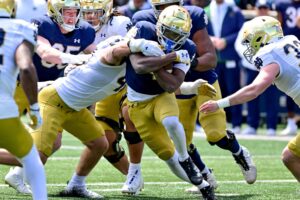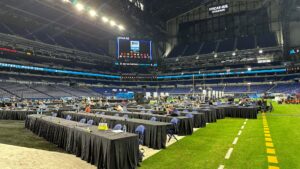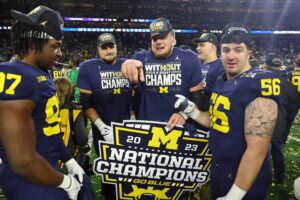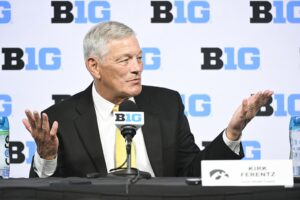All sports have been in flux throughout 2020. That is minor compared to the tumult many have had through the COVID period. Still, some conferences have been under way for weeks now. But the Big 10 and Pac 12 are just now getting back to the work of training camp and game prep.
Last week the conference hierarchy announced a 6+1 game schedule. Every team will play the five schools in their division, plus one crossover game. The two division winners will play a conference championship game. Everyone else will play a crossover 7th game commensurate with their division standings.
Pac 12; It’s Different For Everyone
To conform to the COVID guidelines the conference coaches assembled via individual Zoom meetings to talk with the media. There are still so many unanswered questions. The start of camp, testing protocols, and that seven-game schedule that is much smaller than any other conference is playing.
Arizona coach Kevin Sumlin said, in regards to the season, and the preparation, “It is different for everyone.” Sumlin recently tested positive for the COVID-19 virus. He said he has had no significant symptoms, but may miss the first few days of camp due to start this weekend. Sumlin also pointed out that there are differences throughout the conference. Some teams have had a few spring practices whilst others had none. He sited locality as a factor as well.
Early To Bed, Early To Play
There are also some unique situations with the schedule. The conference has long suffered from an imaging problem with people on the East Coast not seeing as many games due to the late kickoff times in their time zone. Now, with no fans at the stadiums to consider, the conference decided to flirt with some early start times. In week one, USC will be playing Arizona State at 9 a.m. pacific coast time.
It certainly means an early wake-up call for college athletes. Arizona State head coach Herm Edwards said his team already practices in the morning and this will not be a big adjustment. “Look, when you’re playing a football game, regardless of what time it is, players are excited to be playing.” Edwards is also a notoriously early riser, routinely getting up around 4 a.m. “In life, when you get a certain age you start checking the clock like at twelve o’clock at night to make sure you can wake up. I’m at that age where you check it after twelve o’clock and check it every hour and say ‘I’m doing good because I woke up.’”
USC’s Clay Helton said he is less worried about the start time of the game. “You have to remember how grateful and appreciative we are to play the game, first. It wasn’t too long ago we were sitting watching other teams play and it hurts. You shouldn’t be able to watch other teams play and not have that opportunity. The approach for us is just to put the ball down. We don’t care what day it is, what time it is.”
Stanford’s David Shaw has long been an opponent of the early games. The opportunity to play this fall does not change that. “My thoughts haven’t changed.” Shaw talked about getting to know Dr. William Dement of Stanford. Dement was a pioneer in the science of sleep research prior to his death earlier this summer at the age of 91. “College kids don’t go to bed at nine o’clock at night,” Shaw said. “They are not built that way. They need to sleep. And sleep enhances performance. A 9 a.m. kickoff is a 6 a.m. wake-up call.”
What It Took To Get Here
Stanford, along with Cal, UCLA, USC, and the two Oregon schools have had more to navigate to get to this point than most other schools did. They all had county health department issues. In some cases, they had to go to the state for their clearance waivers to be able to open camp. Some schools have pushed a little harder through the bureaucracy. Our sources have told us for other stories that Stanford was not one of those. “We’re not fighting the county. We’re not fighting the state. I believe, as my wife always says, in good intentions. The intentions are to keep our community safe. So I don’t fault anybody for the policies that we’ve had to enact as a state and as a county,” Shaw said.
UCLA’s Chip Kelly, along with his wife, tested positive for the virus back in the spring. He says he is, empathetic to anybody when it comes to COVID. “We have had players on our team that have lost family members. It’s real, and we exactly understand where anybody, that if they decided they didn’t feel safe, we support them from where they are coming from.” To that point, UCLA, like many other schools has dealt with the issue of players choosing not to play through the COVID crisis. UCLA had defensive back Kenny Churchwell opt-out.
Kelly said “Everything has become day to day with COVID in terms of managing the football program. When you hear from the trainers who’s available for your workout session that day, you are just excited when everyone is available.” Between the antigen tests and the PCR tests, the UCLA program is now up to 10 tests per week for each player.
No Room For A Loss
The Pac 12 schedule is a tightrope walk. Already with fewer games than other conferences, there are no built-in BYE weeks. If a game gets canceled due to a team having a virus breakout, that game just gets canceled and there are even fewer games. “All these games become similar to tournament play,” Edwards said. “When you win you move on. When you lose, you feel like there is not a lot of room for error.”
With the reduced schedule, the questions have been constant, “what if” an undefeated Pac 12 champion (7-0) should get consideration for a playoff spot. Shaw says it is going to depend on a multitude of factors. “The last two weeks have proven that rankings don’t mean anything. Not everybody is going to play every game. Some teams are going to falter. We have to wait and see how it all shakes out.”
Utah’s Kyle Whittingham, long a proponent of an expanded playoff says now is the time more than ever, with everyone playing a different number of games. “I think it is going to happen. I don’t think it’s a matter of if, it’s when.” Whittingham began his media time with a tribute to the late guitarist Eddie Van Halen who died from cancer Tuesday. Whittingham showed the audience his Van Halen t-shirt. He acknowledged that the conference is suffering an image problem but said you have to play your way back into national prominence. “We are going to have to have someone have a breakout year.”






